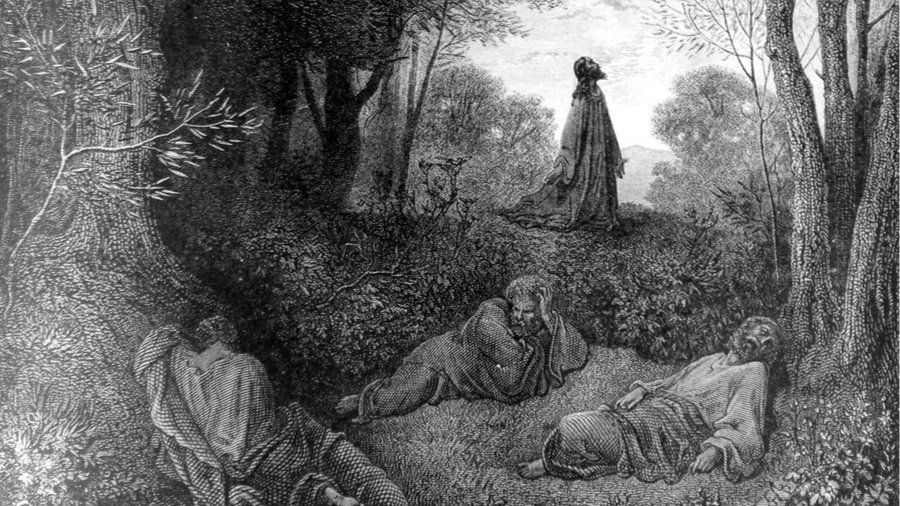Although He Was a Son: How and Why Did Jesus Learn Obedience
“Although he was a Son, he learned obedience through what he suffered.”
“It’s the most natural thing in the world for a son to learn obedience by suffering (ref Heb 12.5-6), but it is not any ordinary son that (the author of Hebrews ) is speaking about here, but the Son of God.”
We know that, for us, the best teacher of all is the ‘school of hard knocks’. Nothing teaches like the unpleasant consequences that come from our missteps, faulty assumptions, and above all – disobedience. But what does that have to do with our Lord Jesus, our Savior, who knew no sin?
To move us closer to the answer, let us first acknowledge that the ‘school of hard knocks’ is an equal opportunity educator – admitting in not only the guilty, but the otherwise innocent. How else to understand the wisdom of God in having Jesus, the innocent and spotless lamb, die at the same time and place as two convicts. (A blessed coincidence for one)
“One of the criminals who were hanged railed at him, saying, ‘Are you not the Christ? Save yourself and us!’ But the other rebuked him, saying, ‘Do you not fear God, since you are under the same sentence of condemnation? And we indeed justly; for we are receiving the due reward of our deeds; but this man has done nothing wrong.’ “ (Luke 23.39-41)
Indeed, Jesus’ suffering was not only the cross but all instances he experienced of unjust hatred, doubt, misunderstanding, jealousy and betrayal (a snippet of a much longer list). All this was the result of obedience and righteousness, not personal sin.
And neither did his suffering come as a surprise, but rather it was always anticipated, for he “knew what was in man”. (John 2:25) We might say then, that he learned, many times over, the ‘cost’ of obedience.
This idea certainly confirms the image of the Lord’s Servant, given us through the prophet Isaiah:
“The Lord GOD has opened my ear, and I was not rebellious, I turned not backward. I gave my back to the smiters, and my cheeks to those who pulled out the beard; I hid not my face from shame and spitting. For the Lord GOD helps me; therefore I have set my face like a flint, and I know that I shall not be put to shame; he who vindicates me is near.” (50:5-8a)
Before applying these things to ourselves, let’s us pull back the telescope and consider the context of Hebrews. The recipients of this epistle were undergoing trial and suffering, and their temptation was to escape that by retreating, so as to be less closely associated with Christ and his Church, at least until the social climate changed.
The author sets Jesus before them as the one to concentrate their attention upon; he who refused to turn back and thus was made perfect through suffering. And to remind them that to all who obey him, he is the author of their eternal salvation.
But back to the curious matter of the 2nd person of the Trinity needing to learn anything, much less obedience.
“The wonder is that being the unique Son of God with right of command over … the entire universe, nevertheless … learned obedience and learned it by suffering.” (David Gooding, An Unshakable Kingdom)
As most of us know, there are 2 kinds of ‘learning’, or better, of ‘knowledge’. There’s the kind we drill into the short-term memory banks of our brains, so that we can pass mid-terms and finals, before it all swiftly fades away. Then there’s the kind we hope sticks with us forever, like: ‘don’t tug on Superman’s cape’, or ‘if mama ain’t happy, ain’t nobody happy’, or ‘the fear of God is the beginning of wisdom’.
If this wasn’t the case, football teams wouldn’t have to continuously drill, not only the plays, but the fundamentals of blocking and tackling. Actors wouldn’t spend countless hours learning their lines. Doctors wouldn’t have to do internships and residencies, nor would they refer to their work as “practicing”.
And so it must be, that the incarnate Jesus, who willingly accepted the limits of humanity; if he did not learn obedience by experience himself, how could he understand the pressures upon our frail wills, or what it costs us to obey him. We know that as our High Priest, who sits constantly at his Father’s right hand, and represents our needs to our God, he has NOT forgotten what he learned as he experienced human agony, and therefore what we need from our merciful Father.
Nor should we forget the lessons we might learn from his suffering. C.S.Lewis wrote of his extreme gratitude, that God in His wisdom revealed the details of Jesus’ experience in the garden – the night of his arrest and the day before his crucifixion. It was the Father’s will that he drink the cup of suffering, without resentment, and experience the cost of obedience. As He accepted this, in full submission, he did so with loud cries and tears, not tainted by sin.
“Some people feel guilty about their anxieties and regard them as a defect of faith. I don’t agree at all. They are afflictions, not sins. Like all afflictions, they are, if we can so take them, our share in the Passion of Christ.”
“… and being made perfect he became the source of eternal salvation to all who obey him.”
To God be the glory.

